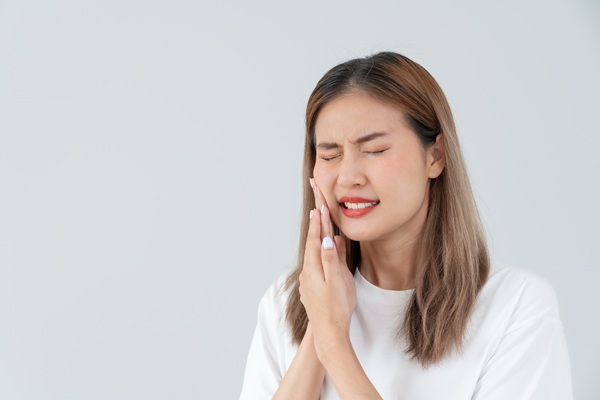Solutions for Common Denture Problems Columbus, OH
Dentures can replace missing teeth and give a patient a fully-functional smile with a natural appearance. We can measure the patient's mouth and develop dentures for the patient's teeth, but we cannot be at the patient's home 24/7. There may be times in which the patient damages the dentures and needs to seek treatment at our office.
While damage or natural wear and tear to dentures is inevitable, we can help patients prevent possible damage and other issues by going over the best methods for effective denture use prior to receiving dentures. Here are a few problems that patients with dentures struggle with and the solution to each.
Speaking and eating
Problem: Dentures can make it difficult when eating or speaking
Solution: Patience, practice and proper care
People who acquire new dentures will find that speaking and eating are more difficult than they realize. We recommend that patients take it slow and practice pronouncing any words that are difficult to say quickly. It may take some time and practice but the patient will eventually speak without difficulty.
When it comes to eating with dentures, the patient needs to start by eating softer foods for the first few days after getting the dentures. If the patient experiences any pain when eating certain foods, it is best to avoid said foods and eat something softer for the time being. Patients can also chew with both sides of the mouth to prevent the dentures from moving forward uncomfortably.
Proper denture care
Problem: Unsure of the best way to keep dentures clean
Solution: Use a specific denture-cleaning solution
Proper denture care is crucial for the lifespan of dentures. If a patient uses regular toothpaste on the dentures, then the toothpaste will begin to erode the material on the dentures and the dentures will break. The best form of care is to remove the dentures and run water through them to clean out any bits of food.
After, the patient can use a specific brush for cleaning the dentures and soak the dentures overnight. We can go over the proper cleaning regimen during the fitting appointment. It is important that the dentures do not dry out overnight.
Check out what others are saying about our denture services on Yelp: Solutions for Common Denture Problems Columbus
Loose Dentures
Problem: Dentures become loose over time
Solution: Seek professional adjustment at our office
Over time, dentures will begin to loosen due to the gums and bones changing. Since there are no longer teeth within the jawbone to stimulate the jaw and the body that teeth are still there, the body will go through a process known as resorption. This process leeches calcium from the jaw bone to other areas of the body in need. Fortunately, we can adjust modify or replace denture as necessary with regular appointments.
When the dentures feel loose, it will not always be a noticeable amount. In some cases, it will begin as a slight shift that the patient may not even notice. However, even if the dentures are only slightly loose, it is crucial to seek repairs from our office.
Irritation in the gums or mouth
Problem: Irritation in the gums or mouth
Solution: Proper care and professional treatment
If the dentures do not fit properly, they can cause irritation on the gums or within the mouth. In cases where the dentures begin to loosen after several months of use, there is a higher chance that the gums will begin to hurt. If the patient continues to feel pain or irritation, then give us a call and schedule an appointment.
The best solution is prevention, if at all possible. By taking the proper precautionary steps, patients can prolong the life of their dentures. When the gums continue to experience irritation, we recommend scheduling an appointment for us to examine the mouth and see what is wrong.
Traveling with dentures
Problem: What to do when traveling with dentures
Solution: Bring the proper cleaning supplies
While one will not need a traveling case for taking the dentures on a flight or car ride, it is crucial to have the proper cleaning tools for the trip. Traveling with dentures can be easy if one brings the proper cleaning fluid and container/glass to soak the denture in overnight.
Similar to bringing a toothbrush, patients need to bring whatever solution or brush they use to clean their dentures with them. Even though one is on vacation, keeping dentures in the best shape possible is important for one's overall health.
Call us today
If you are interested in dentures or are experiencing issues with your dentures, give us a call at (614) 343-0227 today. We will schedule a consultation and recommend the best course of action to help you solve the problem and continue to live a healthy life.
Questions Answered on This Page
Q. What can I do if my dentures fall out when speaking and eating?
Q. What can I do to deal with loose dentures?
Q. How should I take care of my dentures when I am traveling?
People Also Ask
Q. How do I take care of my dentures?
Definition of Denture Terminology
- Alveolar Bone
- The alveolar bone is the bone surrounding the root of the tooth that keeps the tooth in place.
- Bruxism/TMJ/Soreness
- Bruxism/TMJ soreness is the pain that follows excessive and unconscious teeth grinding and jaw clenching.
- Clasp
- A clasp is a device that holds a removable partial denture prosthesis to the teeth.
- Denture Adhesive
- Denture adhesive help the dentures remain in the mouth and prevent them from falling out when the wearer laughs, speaks or eats.
- Denture Base
- The denture base is the part of the denture that connects the artificial teeth with the soft tissue of the gums.
- Denture Slippage
- Denture slippage is when dentures fall out of place or become loose since the jawbone beneath the gums lack stimulation and begin to diminish.
- Edentulous
- Edentulous is a term that applies to people who do not have any teeth.
- Pontic
- Pontic is another term for an artificial tooth on a fixed partial denture.
- Periodontal Disease
- Periodontal disease is a condition that causes inflammation of the gingival tissues and membrane of the teeth, leading to tooth loss without professional treatment.
- Poor Fitting Dentures
- Poor fitting dentures are typically loose dentures that do not fit properly and fall out when the individual is eating, speaking or laughing.
- Rebase
- Rebase is the process of refitting denture prosthesis by replacing the base material.
- Reline
- Reline is when a professional resurfaces the surface of the prosthesis with a new base material.
- Resin/Acrylic
- Resin and Acrylic are resinous materials that can be components in a denture base.
- Speaking Difficulties
- Patients who do not seek proper dental treatment lose teeth will find that it becomes difficult to speak properly and may need artificial teeth to speak clearly again.
- Stomatitis
- Stomatitis is the inflammation of the tissue that is underlying a denture that does not fit properly. It can also result from other oral health factors.
- Xerostomia
- Xerostomia is also known as dry mouth, which is a condition where the salivary glands do not make enough saliva to keep the mouth moist.
Back to top of Solutions for Common Denture Problems




